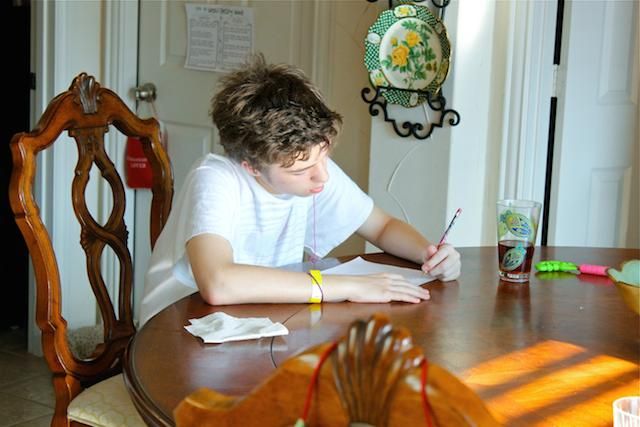You'll be hard pressed to find a parent who doesn't want the best for their child.
It's a biological trait that is baked into each parent, like a microchip in a cellphone. A huge part of that involves making sure they have the very best education. Nothing is quite the guarantor of future success as quality schooling is.
For the most part, the public school system has provided that, and has done an excellent job of bringing young people into the adult world with the intellectual faculties required to thrive.
But what happens when your child's schooling goes wrong? What happens when you're failed by your school, and nobody is on your side? What happens when each morning is an unhappy one, faced with the knowledge that your child will almost certainly have an unrelentingly arduous day at school.
For many thousands of parents, the answer has been to abandon the public schooling system in its entirety and to embrace something radically different. Homeschooling.
The homeschooling phenomenon is a relatively recent one, and admittedly one which attracts a great deal of controversy. It involves taking children from the mainstream education system, and education them in the confines of their home, usually by a parent or a paid tutor.
Motivations for homeschooling range from religious and moral reasons, to a desire to protect their children against bullying. Regardless, the decision to move the classroom to the kitchen table is a brave one, with many parents having made the drastic step to give up their careers in order to provide their children with the best possible education.
Thankfully, for parents who have chosen to eschew traditional learning, there is help. An entire industry has sprung up around assisting parents with educating their children, even if they don't have any formal educational training themselves. A significant part of this involves leveraging modern information technology to better deliver educational material.
I spoke to two parents who have made the radical decision to homeschool their children, as well as one teenager who is currently taking charge of his own education in a homeschooled environment. I was curious about their experiences, and wanted to explore how some homeschoolers are using technology to enrich their child's learning. This is what I learned.
Choose The Right Syllabus
The Bahamas are notoriously picturesque, and it is here where Jackie Dack has settled down with her husband and her beautiful children; Rory and Tallulah. The lively Mancunian mother of two has lived here for the past few years, where she has cultivated a charity which she runs from her home.
Rory and Tallulah were attending a well-respected private school on the island, and for the first few years things were going really well. It wasn't until Rory and Tallulah's fifth year at the school when things started to go sour. After months of extreme, unrelenting bullying by her children's teachers, Jackie made the only choice she could. She decided to pull her children out and start homeschooling. Things weren't easy at first.
'At first, it was hell. The kids were wrecked. They couldn't learn. They'd been taught to take tests. They couldn't think. They had zero confidence, no concentration. I didn't know what I was doing… Ugh. Honestly, the situation at their school had to have been that bad. It was like being placed in a catapult sling and the atrocious school was the pull back which managed to get us enough momentum to get us through the initial homeschooling years'
Thankfully, Jackie soon found something which made her life infinitely easier. The Calvert homeschooling curriculum.
I (out of pure lack of confidence and panic) bought the best curriculum package on the market. It was recommended to us by someone who homeschools. We do Calvert which - yes, it is American -, but it is the oldest and most well-respected curriculum in the world. The support and the setup is really top notch. The kids are doing a decent, well-thought-through, well-presented, mixture of 'old-school' things mixed with modern stuff. Calvert's kind of standard is that kids should know their times tables "Not that I would, but, if my kid was woken up from a deep sleep and asked 7 times 8... they would mutter '56' without hesitation" type thing.
Calvert is old school. That's not to say that it's behind the times. If Tallulah and Rory get stuck with something and Jackie can't help out, they can just email the Calvert teachers. They just so happen to be in Maryland. Tests aren't taken in sweltering gymnasiums in summer, but rather in the air-conditioned comfort of their home.
Once the tests have been taken, they are then scanned and emailed to the examiner, where it is them graded and returned. Likewise, lessons are delivered remotely, and can be taken at whatever pace is felt to be appropriate. Lessons which the child excels at can be skipped or breezed through, whereas if a child is struggling, you can slow the pace.
However, Calvert isn't the only option out there. AngryGamerMom is another parent who homeschools (she prefers the term 'virtualschooling') her child. She lives in Miami, Florida with her husband - a web developer working for Florida Atlantic University - and her daughter. After a period of extreme, violent bullying and harassment, she made the decision to withdraw her daughter from school.
AngryGamerMom employs the services of the Miami-Dade Online Academy to provide academic instruction to her child, who use a curriculum called K12. By a technicality, this isn't considered homeschooling. The virtual academy has the full support of her local school district, who administer standardized tests based upon the syllabus.
Despite this, the courseware offered is engaging. Lessons are interactive Flash applications, and there are apps offered to supplement the child's learning. In addition, there is an obligation to complete assignments on the Study Island website. By all accounts, the courseware used by AngryGamerMom seems to have an emphasis on being engaging, entertaining and accessible.
Buy An iPad (And Fill It With Apps)
The iPad is used extensively in education. This year, the LA School District dropped a cool $1 billion on one of Apple's much-loved tablet computers for each of their students. The amount of educational applications on offer is simply staggering. With that in mind, it make sense that homeschoolers would take to it with enthusiasm.
AngryGamerMom's daughter owns an iPad that is well-stocked with applications that augment the learning process, and complement each subject. Some are aimed at improving reading speed (Timed Reading Practice app by K12: we use this to increase her words per minute."), whilst others are for unwinding ("Relax+Jr by Andrew Johnson: I use this on her when she is struggling to find her focus").
Others are used to incentivize the learning process. One used is Math Brownie Points. This isn't yet-another-Math-app, but rather one that rewards commitment and learning with points that can be redeemed on applications in the App Store.
These are rounded off with some pretty unsurprising additions. There's the Merriam-Webster dictionary, as well as the Kindle app for e-books, including novels that need to be read as part of school assignments.
Find Inspiration In Unusual Places
Learning Math can be a pretty dry affair. But what if you could learn mathematics and computer science through Minecraft? It's more likely thank you think, as AngryGamerMom's daughter shows:
[My Daughter] … entered kindergarten knowing how to read, add, subtract, and simple multiplication thanks to Minecraft. We have found that Minecraft is a huge help. We have used it since its alpha days. She entered kindergarten with full understanding of resources, how to use them, etc. But, as she was learning about resources and crafting, she was learning a much more important skill (multiplication). As she got older, she got into modding Minecraft and using the console, this is a great way to get her used to code and hopefully in the near future, she will be writing code.
Leaving the mainstream schooling system means that you have a great deal of flexibility when it comes to the ways you teach your children. For AngryGamerMom, she is able to effectively teach ostensibly dry subjects using video games.
Letting Them Control Their Own Learning
Jacob MacDonald is a Canadian teenager living in the Central Valley area of California. He arrived in the United States as a child, about to start the formative stages of his education. However, it soon became apparent that the local public schooling system wasn't quite right for him.
We arrived in California just as my brother and I were about to start school, and my parents really didn't like the public school system. The lack of a positive moral direction in school was certainly a factor, but that alone would not have gotten my mom to homeschool us. Both my parents grew up in public school, but their opinion of the local schools was bad enough that they decided that homeschooling was the best option.
As Jacob has reached adulthood, he was allowed to take control of what he chooses to learn. As a young, technologically-inclined young adult, a significant part of his studies involves learning to become a software developer.
At this point, I am mostly self-teaching. I have taken classes at a local junior college for all four years of high school… I have also taken online courses, both the free ones available on platforms like Coursera and paid classes geared toward families like mine. This year, I am working part-time at a local software engineering firm. In terms of technology, my MacBook Air is my link to "the outside world". I have a cell phone, but no data on that, so I depend on biking to Internet hotspots to program, learn, and stay in touch with people.
Most of my personal programming (as opposed to work programming) time is spent tweaking my Emacs configuration! I basically survive on Emacs, Chrome/Firefox, Steam, and a terminal. While I'm on the Web, I spend a lot of time on Reddit, in GMail and Google Voice, and on GitHub. Programming language of choice, for those who care, is Lisp. Emacs Lisp, of course, is essential for tweaking Emacs, I am trying to learn Common Lisp well, and I think there's a ton of potential in Clojure/ClojureScript...
It's hard to imagine most high schools teaching Common Lisp. For those not intimately familiar with software development, it's a programming language that uses a style called 'functional programming'. Without delving too deep into the lexicon of software development, it allows programmers to write programs using fewer lines of code by treating everything as pure mathematical functions.
Because Jacob has full control of what he chooses to learn, he is able to study what interests him personally. This in itself has innumerable benefits. There's less chance of him losing motivation or enthusiasm, or simply acting out because he has been forced to do something he doesn't enjoy doing.
Learning outside of the classroom has also afforded Jacob the chance to enhance his studies with on-the-job training. Something he simply wouldn't have been able to do if he was stuck in a classroom day-in and day-out.
Thoughts About Homeschooling
These interviews gave me a lot to think about. Each of the parents I spoke to were incredibly passionate about their child's education, and the decision to take control of it is an incredibly brave one.
I was surprised at the maturity of the products on offer. There's an entire marketplace of products designed specifically for homeschoolers. These are polished, developed and have undergone countless iterations of improvement.
I was also impressed with the diversity of the various products used by homeschoolers. This was touched upon by Jackie with respect to curriculums. There are a huge number of companies flogging their own comprehensive curriculums, and these appeal to the personal world views and preferences of the parents.
The ingenuity of the parents homeschooling also impressed me. I was amazed at how parents who had not grown up with the plethora of consumer electronics that we enjoy have leveraged them to enhance their child's education.
In particular, I was surprised to see how touchscreen devices were the mainstay of most homeschoolers. There wasn't a noticeable preference for platform, with Jackie providing her daughter an Android tablet (in the form of a Kindle Fire) whilst AngryGamerMom prefers the iOS-based iPad.
Regardless of the platform, there's still a flourishing market of applications designed to supplement any homeschool child's education. Apparently, the homeschool market is sufficiently large enough to attract developers.
However, I did notice some major drawbacks.
The first, a number of products used by homeschoolers had an impressive initial cost of ownership. Tablet computers can be expensive. Computers are expensive. Enrolling in a curriculum is ludicrously expensive, with Calvert costing as much as $3,940.00 per child per year.
I can't help but think that this is out of the reach of a lot of parents, especially when you consider the loss of one parental income. Although to the credit of Calvert, there does seem to be some financial aid available.
If you ask me, the best feature of the public schooling system is how access to quality education isn't dependent upon the financial assets of a parent. This is because the huge costs of tuition and equipment are borne by the government, which has vastly more assets than most parents.
I'm also concerned about the lack of oversight when it comes to homeschooling resources. Within the framework of the state system, schools are heavily regulated and monitored. In the UK - where I was schooled - there was yearly inspections by a government body called OFSTED, where the school was ranked by its performance and severely admonished if it was seen to be failing the students in its care.
There's no such oversight in the app world. There's no requirement for an app developer to have any form of formal teaching or academic qualifications. Given enough resources, it's entirely possible for someone to create an entire, bogus curriculum. The same degree of oversight simply isn't there.
Conclusion
I'm pretty conflicted about homeschooling as a concept.
As a child of a teacher, I have a devoted reverence to the public school system. I admire the devotion of educators, and as a result I struggle to stomach the decision to leave that system behind.
With that said, homeschooling allows parents to take control of their child's education. To ensure that they get the very best schooling. To protect them from the sharp barbs of their schoolmates, and from the malfeasance of teachers and administrators.
For Jackie, AngryGamerMom, and Jacob, their experiences with homeschooling have been overwhelmingly positive.
Jacob was able to develop academically and professionally in a field which he is passionate about. He did that whilst learning things (LISP) which are seldom taught in universities, let alone in the public school system.
Likewise, AngryGamerMom and Jackie chose to leave the public school system in order to protect their children from bullying. By leaving that system, they accomplished that whilst providing a varied, broad education, which challenges their children to their fullest and demands nothing but their best.
Perhaps the biggest take-home lesson from this article is not how technology empowers homeschooled children, but how parents can provide their children with a quality outside the the traditional paradigms. Technology is an infinitesimally small part of that.
How do you feel about homeschooling? Were you homeschooled? I'd love to hear your thoughts. Why don't you drop me a comment below?





